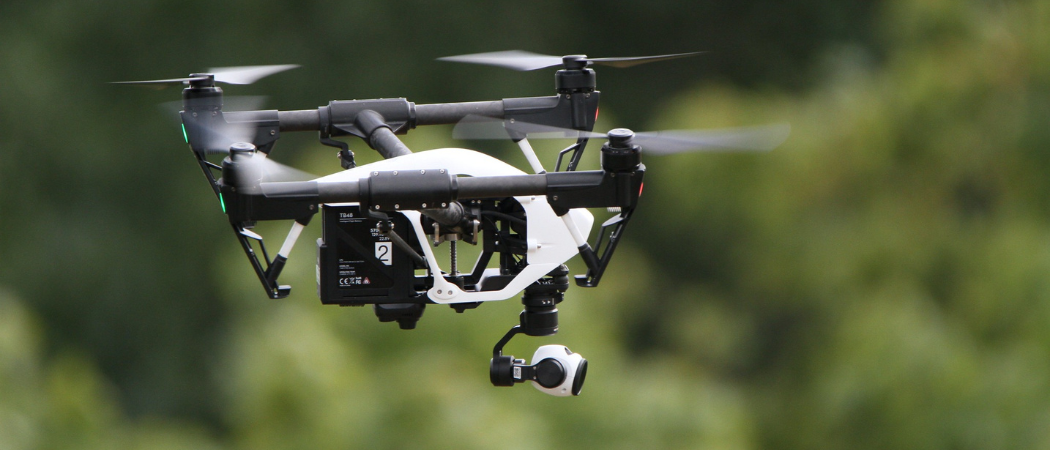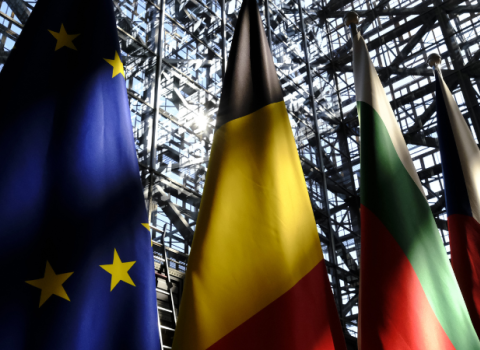Civil security research relies on EU funding. Industry wants reassurance this will not be cut because of the increase in defence R&D

Photo credits: DFSB DE / Flickr
Industry is calling on the EU to step up investment in civil security by setting up a new programme covering everything from research to procurement - which could mean moving existing research support out of Horizon Europe.
Burkard Schmitt, defence and security director at the industry association ASD, says the Commission should consider consolidating all security-related EU instruments into a single European security fund under the Security and Defence heading of the EU budget.
This would include Cluster 3 of Horizon Europe,‘Civil Security for Society, which funds research is areas including terrorism and climate disasters. It would also incorporate the Internal security fund, currently one of dozens of fragmented funds providing follow-on funding for the deployment of security solutions.
“This would allow coherent and cost-efficient links between the planning, research, development, procurement and deployment stages,” Schmitt told Science|Business.
More investment in research and innovation alone will not be enough, says Schmitt. He believes a coherent security industrial policy is needed to strengthen Europe’s technological autonomy, including “a strategic procurement policy to ensure uptake of EU-funded technologies by European end-users”.
ASD wants the European security fund to be a purely civil instrument, separate from the European Defence Fund, which supports cross-border defence R&D projects, but says it should foster synergies with space and defence technologies.
This comes amid uncertainty over the next Framework Programme, FP10, with the Commission drawing up plans to incorporate it into into a new European Competitiveness fund from 2028.
Jürgen Beyerer, chair of the Fraunhofer Segment for Defence and Security VVS, which brings together 12 Fraunhofer research institutes and is involved in around a dozen Cluster 3 projects, said synchronising different security programmes would help to ensure stronger synergies.
“However, we definitely need to continue to provide separate funding for civil security research,” Beyerer told Science|Business. “Fraunhofer is, in principle, prepared to discuss the framework conditions of a possible European security fund.”
Research priorities
Cluster 3 is the smallest of the six clusters, with a budget of €1.6 billion. This is less than the €1.7 billion allocated to security research in the last framework programme, Horizon 2020.
Research priorities include fighting crime and terrorism, border management, protecting critical infrastructure, cybersecurity, and protecting against natural and man-made disasters.
Due to its limited budget, the programme focuses mostly on high technology readiness levels and supporting end users such as law enforcement, border guards and civil protection authorities.
Around a third of spending in Cluster 3 goes to cybersecurity research. The European Cybersecurity Competence Centre was set up in 2021 to bring the ecosystem together, to pool investment in research, development and deployment, and to coordinate planning by Horizon Europe and the Digital Europe Programme.
Wake-up call
Russia’s invasion of Ukraine has been a wakeup call for Europe, highlighting the need to scale up defence capabilities, including in the long term by investing more in research and innovation. Last month, Commission President Ursula von der Leyen named the EU’s first ever dedicated defence commissioner, whose missions will include reinforcing EDF.
However, defence is only one side of the coin when it comes to keeping Europe safe, says Nicolas Bessot, head of unit for innovation and security research at the Commission’s directorate general for migration and home affairs.
While Cluster 3 projects do not prepare for war scenarios since Horizon Europe has an exclusively civil focus, they do cover hybrid threats which are often part of modern warfare, and can include cyberattacks, disinformation, and biological attacks.
“The measures taken to protect or ensure the resilience of the civil infrastructures are civil security measures, requiring civil security innovation. If there was an attack on financial services, how would you restore the services? This is all civil security,” Bessot said.
In January, the Commission launched a consultation on the possibility of updating Horizon rules to allow dual use projects with civil and defence applications. The idea received mixed reviews, and some are worried that without a significant increase in funding, changing the eligibility rules could further restrict opportunities in the civil sector.
In its contribution to the consultation, the European Association of Research and Technology Organisations noted that the budget for defence research has grown in recent years, while civil security research funding has declined. “With a potential abandoning of the exclusive focus on civil applications, many RD&I actors see the risk of a further gradual decrease of the civil research budgets to expand the defence research one,” it said.
Many civil security topics are inherently dual use. Cybersecurity is relevant in civil and military settings for example, while drones can be used to gather information for civil authorities, or to destroy military targets.
The technological requirements will differ depending on the intended use, and so while innovators want to see more synergies between civil and defence research, they also want to ensure both are supported.
Both EDF and the successor programme to Horizon Europe, FP10, require increased budgets, said Beyerer. “Increased funding for one programme must not come at the expense of the other programme's budget,” he said.
Fraunhofer does though call for the separation between civil and defence research to be reviewed, with a “comprehensive impact assessment” of the different options for supporting dual-use research.
“In our globalised, interconnected world, there is only one form of security, even against the backdrop of the current geopolitical situation. In order to effectively counter threats — be they cyberattacks, the sabotage of infrastructure or the spread of fake news — all aspects of vulnerability should ideally be considered together,” Beyerer said.
Reliance on EU funding
EU coordination is seen as the most efficient way to invest in civil security R&I, since member states are facing very similar challenges. “The majority of issues in the field of European security are not bound by national borders. Collaboration and shared solutions are essential,” said Beyerer.
A majority of member states do not have an equivalent national programme, meaning EU funding is crucial. A recent expert report on Horizon Europe Clusters 1-3 found that national security research programmes exist only in Germany, Austria, Bulgaria, Czechia, and Italy.
According to the Commission, Horizon 2020 funding accounted for around half of all public financing for civil security research in the EU between 2014 and 2020.
“Most member states are heavily reliant on Horizon Europe for their civil security research and innovation,” said Bessot. “Less investment in this area means having member state authorities less well equipped to fight organised crime, terrorism or protect our critical infrastructures.”
Another challenge companies are facing is the fragmented security market in Europe, where there is a wide variety of different buyers, at city, regional and national levels, with little coordination and strict regulations. This makes it difficult for innovators to have their technology adopted by public authorities, and to achieve economies of scale, in turn disincentivising private firms from investing in R&D.
“Commercial customers tend to limit investments in security to what is strictly necessary, whereas public customers are often legally bound to purchase at the lowest price,” said Schmitt. In reality, that often means relying on non-European technologies.
Both types of customer tend to purchase off-the-shelf products to meet immediate security needs and respond to crises rather than investing in research based on long-term capability planning, Schmitt added. “This means that the transition from R&I to market uptake in civil security is arduous, especially for start-ups and SMEs.”
Fraunhofer wants to see “a substantial increase or shift of funding and research topics from other sectors to the security sector”, as threats related to climate change and geopolitical upheaval multiply.
“European security solutions are needed in order to guarantee the strategic autonomy of the EU and avoid critical dependencies,” Beyerer said.
“EU security research is also one of the few entry points for both civil security personnel and the general public to participate in security-related R&D.”
A number of member states’ interior ministries also now have an innovation unit, and some EU agencies like Europol and Frontex have innovation labs, but the budgets are modest. The EU Innovation Hub for Internal Security, hosted at Europol, brings together some of these labs to discuss innovation projects, identify potential synergies, and facilitate uptake.





 A unique international forum for public research organisations and companies to connect their external engagement with strategic interests around their R&D system.
A unique international forum for public research organisations and companies to connect their external engagement with strategic interests around their R&D system.